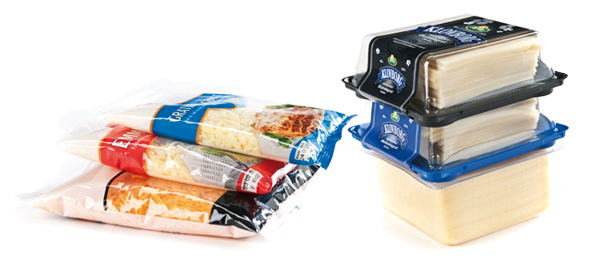Modified Atmosphere Packaging of Cheese

It might at first seem a little strange that cheese needs protecting from microbes – after all, microorganisms have a crucial role to play in cheese making. Nevertheless, while some microbes are ‘good’ and useful in cheese making, others are not and can cause cheese to become spoiled. In general, hard cheeses that do not have a high water content are susceptible to attack by moulds, while moister cheeses can be affected by bacteria. Also the fats of some cheeses are prone to oxidation by oxygen in the air, which can make the cheese become rancid.
The main gas that is used in modified atmosphere packaging (MAP) to prolong the freshness of hard cheese is carbon dioxide. Hard cheese can be packaged in an atmosphere of total carbon dioxide, while for soft cheeses the proportion is typically between 20 and 40 per cent, with the remainder being usually nitrogen. The main reason for this approach with softer cheeses is that over time the carbon dioxide can dissolve in the water that is within the cheese, and this reduces the volume of gas in the package, eventually causing the packaging to collapse. The presence of the nitrogen prevents the packaging from collapsing.
Modified atomsphere packaing is particularly good for grated or sliced cheeses as it permits a space to be retained around the cheese when it is in its packet. This allows the cheese to ‘breathe’ and develop more flavour and also makes the individual pieces of cheese easier to separate once the packet is open. This is not the case if the cheese is vacuum packed, for example, where the contents are necessarily compacted. In this way, modified atmosphere packaging not only improves the shelf life of the product, but can also have a positive affect on both the flavour and appearance of the cheese.
A hard cheese such as cheddar which has been packaged in an atmosphere of high CO2 can have its shelf life extended from two to three weeks in air to up to ten weeks in MAP. A soft cheese might typically last for eight days if stored in air, but three weeks if under an appropriate atmosphere mixture of carbon dioxide and nitrogen.
The main gas that is used in modified atmosphere packaging (MAP) to prolong the freshness of hard cheese is carbon dioxide. Hard cheese can be packaged in an atmosphere of total carbon dioxide, while for soft cheeses the proportion is typically between 20 and 40 per cent, with the remainder being usually nitrogen. The main reason for this approach with softer cheeses is that over time the carbon dioxide can dissolve in the water that is within the cheese, and this reduces the volume of gas in the package, eventually causing the packaging to collapse. The presence of the nitrogen prevents the packaging from collapsing.
Modified atomsphere packaing is particularly good for grated or sliced cheeses as it permits a space to be retained around the cheese when it is in its packet. This allows the cheese to ‘breathe’ and develop more flavour and also makes the individual pieces of cheese easier to separate once the packet is open. This is not the case if the cheese is vacuum packed, for example, where the contents are necessarily compacted. In this way, modified atmosphere packaging not only improves the shelf life of the product, but can also have a positive affect on both the flavour and appearance of the cheese.
A hard cheese such as cheddar which has been packaged in an atmosphere of high CO2 can have its shelf life extended from two to three weeks in air to up to ten weeks in MAP. A soft cheese might typically last for eight days if stored in air, but three weeks if under an appropriate atmosphere mixture of carbon dioxide and nitrogen.




